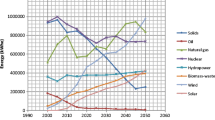Abstract
Ecuador's energy mix has greatly reduced its dependency on fossil fuels the last 15 years, down to a marginal role (5%) in electricity generation in 2017. The development plan for the Ecuadorian power network aims to keep adding hydropower to meet the increasing demand. A prospective lifecycle assessment (LCA) of the future power network (2012–2050) can determine the feasibility of the development plan and its environmental sustainability in the long run. For a quantitative analysis of the energy transition over the entire lifecycle, the simulation software® Global Emission Model of Integrated System (GEMIS) is used. The results show that the current development path of the Ecuadorian energy system reduces the emissions of CO2 per kWh generated by 65% due to the large share of renewable energies, mainly hydropower, which costs 1% of Gross Domestic Product. The obtained LCA footprints are similar to the literature benchmarks.
Access this chapter
Tax calculation will be finalised at checkout
Purchases are for personal use only
Similar content being viewed by others
References
R. Carles, Energy Resources and Crisis the End of 200 Unrepeatable Years, 2nd edn. (Oficina de Publicacions Acadèmiques Digitals de la UPC, Barcelona, 2011).
F. Kern, K.S. Rogge, The pace of governed energy transitions: agency, international dynamics and the global Paris agreement accelerating decarbonisation processes? Energy Res. Soc. Sci. 22, 13–17 (2016). https://doi.org/10.1016/j.erss.2016.08.016
E. Kyritsis, J. Andersson, A. Serletis, Electricity prices, large-scale renewable integration, and policy implications. Energy Policy 101, 550–560 (2017). https://doi.org/10.1016/j.enpol.2016.11.014
L. Vintimilla, “Apagones y soluciones” El sector energético: presente y perspectivas. CIE Corporación para la Investigación Energética (2002)
M. Ayala, J. Maldonado, E. Paccha, C. Riba, Wind power resource assessment in complex terrain: villonaco case-study using computational fluid dynamics analysis. Energy Procedia 107, 41–48 (2017). https://doi.org/10.1016/j.egypro.2016.12.127
“Plan Maestro de Electrificación 2013–2022 VOL III,” 2013.
A.D. Ramirez, A. Boero, B. Rivela, A.M. Melendres, S. Espinoza, D.A. Salas, Life cycle methods to analyze the environmental sustainability of electricity generation in Ecuador: Is decarbonization the right path? Renew. Sustain. Energy Rev., 134, 110373. https://doi.org/10.1016/j.rser.2020.110373
P.E. Carvajal, F.G.N. Li, R. Soria, J. Cronin, G. Anandarajah, Y. Mulugetta, Large hydropower, decarbonisation and climate change uncertainty: modelling power sector pathways for ecuador. Energy Strateg. Rev. 23, 86–99 (2019). https://doi.org/10.1016/j.esr.2018.12.008
P. L. Castro Verdezoto, J. A. Vidoza, W.L.R. Gallo, Analysis and projection of energy consumption in Ecuador: energy efficiency policies in the transportation sector. Energy Policy 134, 110948 (2019). https://doi.org/10.1016/j.enpol.2019.110948
“Plan Maestro de Electrificación 2013–2022 VOL II,” (2013)
B. Guezuraga, R. Zauner, W. Pölz, Life cycle assessment of two different 2 MW class wind turbines. Renew. Energy 37(1), 37–44 (2012). https://doi.org/10.1016/j.renene.2011.05.008
R. Madlener, S. Stagl, Sustainability-guided promotion of renewable electricity generation. Ecol. Econ. 53(2), 147–167 (2005). https://doi.org/10.1016/j.ecolecon.2004.12.016
A. Makhlouf, T. Serradj, H. Cheniti, Life cycle impact assessment of ammonia production in Algeria: a comparison with previous studies. Environ. Impact Assess. Rev. 50, 35–41 (2015). https://doi.org/10.1016/j.eiar.2014.08.003
H. Yang, L. Ma, Z. Li, A method for analyzing energy-related carbon emissions and the structural changes: a case study of China from 2005 to 2015. Energies 13(8), 1–24 (2020). https://doi.org/10.3390/en13082076
N. Thonemann, A. Schulte, D. Maga, How to conduct prospective life cycle assessment for emerging technologies? A systematic review and methodological guidance. Sustainability 12(3) (2020). https://doi.org/10.3390/su12031192
R.N. Shaw, P. Walde, A. Ghosh, Effects of solar irradiance on load sharing of integrated photovoltaic system with IEEE standard bus network. Int. J. Eng. Adv. Technol. 9(1) (2019)
R.N. Shaw, P. Walde, A, Ghosh, A new model to enhance the power and performances of 4×4 PV arrays with puzzle shade dispersion. Int. J. Innovat. Technol. Exp. Eng. 8(12) (2019)
V. Rakotoson, J.-P. Praene, A life cycle assessment approach to the electricity generation of French overseas territories. J. Clean. Prod. 168, 755–763 (2017). https://doi.org/10.1016/j.jclepro.2017.09.055
Updated capital cost estimates for utility scale electricity generating plants (2013)
IPCC, Climate Change 2007-The Physical Science Basis (United Kingdom and New York: Cambridge University Press, 2007)
Acknowledgements
This research was supported by Secretaría Nacional de Educación Superior, Ciencia, Tecnología e Innovación (SENESCYT), Ecuador;SISAuresearchGroup, Facultad de Ingeniería y Tecnologías de la Información y Comunicación, Universidad Tecnológica Indoamérica, Ambato, Ecuador;Universidad Nacional de Loja, Ecuador; and Centro de Diseño de Equipos Industriales ofUniversidad Politécnica de Cataluña, BarcelonaTech, Spain.
Author information
Authors and Affiliations
Corresponding author
Editor information
Editors and Affiliations
Rights and permissions
Copyright information
© 2021 The Author(s), under exclusive license to Springer Nature Singapore Pte Ltd.
About this paper
Cite this paper
Ayala-Chauvin, M., Samaniego-Ojeda, C., Riba, G., Maldonado-Correa, J. (2021). Lifecycle Assessment of Electricity Generation transition in Ecuador. In: Mekhilef, S., Favorskaya, M., Pandey, R.K., Shaw, R.N. (eds) Innovations in Electrical and Electronic Engineering. Lecture Notes in Electrical Engineering, vol 756. Springer, Singapore. https://doi.org/10.1007/978-981-16-0749-3_1
Download citation
DOI: https://doi.org/10.1007/978-981-16-0749-3_1
Published:
Publisher Name: Springer, Singapore
Print ISBN: 978-981-16-0748-6
Online ISBN: 978-981-16-0749-3
eBook Packages: EnergyEnergy (R0)




